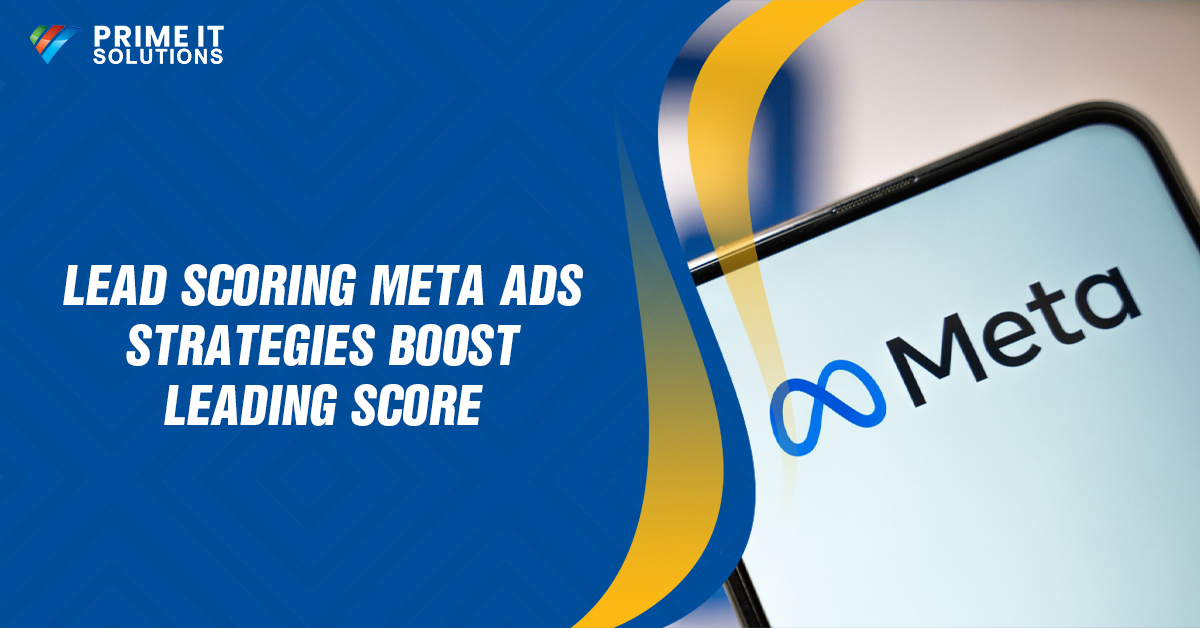Lead Scoring Meta Ads strategies: Boost leading score
If you’re generating a ton of leads via Meta (Facebook) lead ads and don’t know which one to follow up first, then you might consider implementing lead scoring so you can identify the hottest opportunities.
There are some powerful tools that can help businesses streamline their sales funnel by identifying and prioritizing the most promising leads. In this guide, we’ll walk you through essential strategies to master Lead Scoring Meta Ads , from understanding its importance to implementing and optimizing a lead-scoring system that delivers results.
The Importance of lead scoring meta ads
The relevance of lead scoring, particularly predictive lead scoring, stems from its transformative impact on business operations. A meticulously crafted lead scoring model allows you to:
Rank leads using point values, which are assigned based on their attributes, behaviors, and engagement.
Facilitate prioritization and conversion rate optimization.
Enable sales teams to focus their efforts on high-quality leads, reducing uncertainty and ensuring the most likely prospects to become customers receive the attention they deserve.
Lead scoring’s influence on revenue is profound. Research indicates a potential for deal close rates to increase by 30% and company revenue by 18%. Such an uptick in revenue results from the improved alignment of sales and marketing efforts, which guarantees efficient and effective resource allocation.
Facebook lead ads vs. conversion ads
Just like with any advertising strategy, there are different ways to achieve your end goals—and lead-generation ads are no exception. There are two main ways to generate leads with Facebook campaigns.
1. Using the Conversions campaign objective with a self-hosted form on your website,
OR
2. Using the Lead Generation objective with Facebook's instant form
Of course, there are pros and cons to each option.
At the end of the day, the best advice is you can test out both methods and see which one works best.
I've personally seen that a combination of both works best. Using instant forms targeted to mobile devices makes following out forms easier on the go, while I have seen better results driving desktop traffic to a form hosted on the company site. Your results may vary, of course.
Note: If you have the new simplified version of Facebook’s objectives, use Leads in both cases.
Why Facebook Lead scoring meta ads Matters
We’ve already talked about the sheer volume of active Facebook users—and with numbers that high, there’s inevitably a niche for every business, no matter how unique.
What’s more, people engage with brands on Facebook, with 39 percent or more users following business pages to get offers.
Marketers are aware of these figures—in fact, 92 percent of social marketers report using Facebook for advertising.
If all of this isn’t enough to convince you to advertise on Facebook, Facebook lead generation is notoriously cheap compared to alternatives like Google ads, especially when it comes to consumer services and technology.
Why am I not getting leads on Facebook Ads?
So, you’ve been putting significant efforts into your ad campaigns, but no luck. And now, you’re wondering, why am I not getting leads on Facebook Ads?!
Short answer? Your ads across Meta technologies (Facebook and Instagram) might not be optimized. For a more extensive answer, we’ll need to evaluate different elements and aspects of your advertising.
1. You might have restricted your budget too much.
Increasing your ad budget, especially in the initial stages, can improve your targeting. This is referred to as Facebook’s learning phase. Injecting a higher budget in the beginning results in faster learning.
2. You might be using an incorrect objective.
Since you want to get leads from Facebook and Instagram, you naturally should choose lead-focused objectives: lead scoring meta ads, Lead Generation, Traffic, or Conversion. These objectives need to be selected based on your specific lead generation goals.
3. You might lack audience optimization.
Showing even the most perfect ad to the wrong audience leads nowhere. The best option is to create diverse ad sets with varied audiences for testing. Then, use Campaign Optimization features on your Ad Manager dashboard to allocate the budget to the best-performing Ad Sets.
4. Are your ads creative enough?
Creativity is a subjective standard. Besides, what goes on Facebook is heavily linked to the current trends. To find out what your audience responds to best at this time, create multiple ads with diverse images and copy. Then, analyze their performance and optimize based on what you find out.
5. Does your offer sound appealing?
Your offers should align with both your business goals and your audience’s needs. Here are the three dimensions of a persuasive offer:
Your business solves a problem;
Your audience wants the problem solved;
Your offer connects these two points of interest.
A well-crafted offer can improve your lead scoring meta ads significantly. So, test out different offers for better optimization.
6. How does your landing page look?
Your landing page should reflect your campaign goals and audience expectations. Experiment with a variety of landing pages and see which one gets you the highest conversion rates.
6 Secrets to Generating Qualified lead scoring meta ads
Use the Higher Intent Lead Form Setting
When creating your form, select the Higher Intent form type. This does 2 things:
Adds an extra confirmation screen to the lead form; almost like a double opt-it.
The submit button becomes a swipe button. This adds a layer of intent to the submission – it’s not often you swipe to submit a form.
Add More Detail to your Lead Form Introduction Screen
With the Paragraph option selected, there’s no apparent limit to the number of characters you can add to the intro Page. This means you can provide more detail about the products or services you offer. Unfortunately (as of the time of writing) you can’t format this page or add images.
Ask for information that doesn’t get pre-filled in the
If you’ve only been asking for details like first name, email, and phone, that get automatically pre-filled in the lead form, then ask for something the user needs to manually add or select from a dropdown. This might be a short custom question like “When are you thinking of [selling your home]”, or it may be one of the other fields that people don’t always use such as Zip/Postcode.
Here’s an example of a lead form we used with a drop-down question:
Follow-Up Leads Faster
Following up leads with a phone call within 1 hour of the lead being submitted can significantly improve sales conversion rates. According to a study by Harvard Business Review, leads are seven times more likely to convert if you contact them within an hour of submitting a lead form.
“Firms that tried to contact potential customers within an hour of receiving a query were nearly seven times as likely to qualify the lead (which we defined as having a meaningful conversation with a key decision maker) as those that tried to contact the customer even an hour later—and more than 60 times as likely as companies that waited 24 hours or longer.”
This means that contacting a lead in the first 1 hour can result in a 700% increase in conversion. Being this quick to respond to leads may seem impossible, but if you’re a small business, you might try using SMS lead ad notifications or an email autoresponder.
Follow Up Leads in Multiple Channels
If you’ve tried to call a lead a couple of times and haven’t had an answer, then follow up with an SMS and Email. You could also try finding them on LinkedIn and sending them a direct message there, particularly if you’re running a B2B lead generation campaign.
Target High Net Worth People
You can use Meta Ads Demographic, Behaviour, and Interest targeting to show your lead ads to people who tend to have more disposable income.
Finding lead scoring meta ads Success with Prime Technologies Global
lead scoring meta ads is an incredibly powerful tool when used correctly. It allows sales and marketing teams to gain valuable insight into what leads are most likely to convert, and then rank leads according to that criteria — this means you can structure your entire marketing and sales process much more efficiently.
Implementing an effective lead scoring system requires a lot of research, data, and input from various people at your company. However, it’s well worth doing, and the research shows it can be extremely productive.
At Prime Technologies Global, we can guide you through this process and help you navigate the often complex world of lead scoring to get the very best results for your brand. Get in touch with us to learn more and get started.
Bottom Line
Qualifying leads effectively is crucial for maximizing the ROI of your Facebook Lead Ads. By incorporating pre-qualification questions, leveraging custom audiences, and integrating lead data with your CRM via tools, you can ensure that the leads you capture are more likely to convert into valuable customers. The strategies about lead scoring meta ads outlined in this guide will help you refine your approach, reduce time spent on unqualified leads, and ultimately drive better business results. Keep testing and optimizing your lead qualification process to stay ahead in the competitive landscape and ensure your marketing efforts are as efficient and effective as possible.
FAQs
Why is lead qualification important for Facebook Lead Ads?
Lead qualification helps ensure that the leads you capture are more likely to convert into paying customers. This process saves time and resources by focusing your sales efforts on leads with higher potential.
What are some effective pre-qualification questions to ask in Facebook Lead Ads?
Effective pre-qualification questions might include inquiries about the prospect’s budget, timeline, specific needs, or decision-making authority. Tailor these questions to your business and the product or service you are offering.
References:
https://searchengineland.com/facebook-ads-lead-generation-guide-430339




0 Comments: